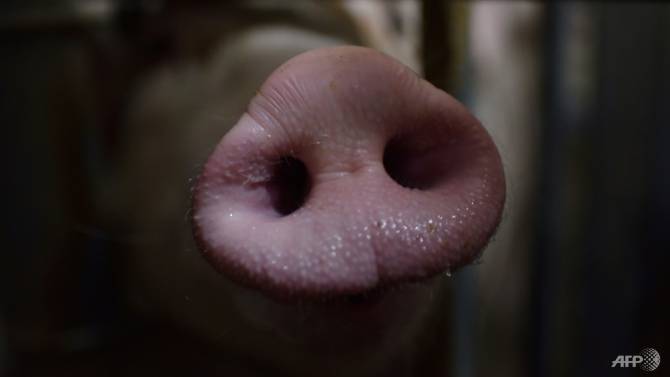November 27, 2025 | 04:24 GMT +7
November 27, 2025 | 04:24 GMT +7
Hotline: 0913.378.918
November 27, 2025 | 04:24 GMT +7
Hotline: 0913.378.918

China's consumer inflation has been driven up in recent years by pork prices after an African swine fever outbreak ravaged stocks. Photo: AFP
The world's second largest economy has largely bounced back from the coronavirus hit, and factory gate inflation began to ease last month after surging at the highest rate in more than a decade earlier in the year as commodity prices spiked.
Factories so far appear to be absorbing the costs rather than passing them on to consumers, and analysts expect Beijing to protect shoppers from rising costs.
China's consumer price index (CPI), a key gauge of retail inflation, rose 1.1 per cent on-year in June - lower than analysts expected, and down from the month before.
The low CPI inflation was "to a large extent driven by slumping pork prices", Nomura chief China economist Lu Ting noted.
China's CPI has been driven up in recent years by pork prices after an African swine fever outbreak ravaged stocks.
Pork prices have now dropped 36.5 per cent from last year's spike, according to the National Bureau of Statistics (NBS), helped by a recovery in live pig production and seasonally weak consumer demand.
The government has a target to keep consumer inflation below 3 per cent this year.
The producer price index (PPI), which measures the cost of goods at the factory gate, rose 8.8 per cent on-year - edging down from the 9 per cent surge in May.
"In June, preliminary effects of policies to stabilise the supply and cost of commodities can be seen ... and the rise in prices of industrial products has slowed," said Dong Lijuan, senior statistician at the NBS.
Lu of Nomura said he expected Beijing to ease some of its carbon emission and production safety rules to boost the production of some raw materials, and remain "strategically focused on boosting the manufacturing sector".
(AFP)

(VAN) A new study reveals how the simultaneous effects of ocean acidification, salinity and loss of oxygen are making the world more fragile.

(VAN) Hopes are growing that the creation of the first 3D turkey gut model could be a turning point in the battle against the virulent blackhead disease.

(VAN) Tyson, America’s biggest meat supplier, plans to shutter one of its largest beef processing plants as the industry continues to struggle with low cattle supplies and political pressure from Washington.

(VAN) New FAO study shows how digital solutions are empowering farmers and fishers to prevent losses and build resilient agrifood systems.

(VAN) Brazil's COP30 presidency pushed through a compromise climate deal on Saturday that would boost finance for poor nations coping with global warming but that omitted any mention of the fossil fuels driving it.

(VAN) Poultry farmers in the UK have been warned that they could face one of the worst winters yet for bird flu.

(VAN) Prices of main-crop paddy have risen sharply, with jasmine rice hitting 16,100 baht per tonne — the highest level in years.